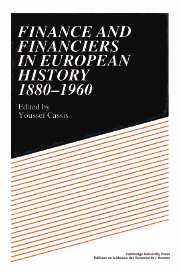Book contents
- Frontmatter
- Contents
- List of figures
- List of tables
- Preface
- 1 Introduction: the weight of finance in European societies
- 2 Banking and industrialization: Rondo Cameron twenty years on
- Part I FINANCIAL SECTOR AND ECONOMY
- Part II FINANCIAL ELITES AND SOCIETY
- 7 Financial elites and British society, 1880–1950
- 8 Bankers in French society, 1860s–1960s
- 9 The banker in German society, 1890–1930
- 10 Financial elites and society: comments
- Part III FINANCIAL INTERESTS AND POLITICS
- Part IV FINANCE AND FINANCIERS IN SMALLER EUROPEAN COUNTRIES
- Part V THE RISE OF EXTRA-EUROPEAN FINANCIAL CENTRES
- Index
7 - Financial elites and British society, 1880–1950
Published online by Cambridge University Press: 12 January 2010
- Frontmatter
- Contents
- List of figures
- List of tables
- Preface
- 1 Introduction: the weight of finance in European societies
- 2 Banking and industrialization: Rondo Cameron twenty years on
- Part I FINANCIAL SECTOR AND ECONOMY
- Part II FINANCIAL ELITES AND SOCIETY
- 7 Financial elites and British society, 1880–1950
- 8 Bankers in French society, 1860s–1960s
- 9 The banker in German society, 1890–1930
- 10 Financial elites and society: comments
- Part III FINANCIAL INTERESTS AND POLITICS
- Part IV FINANCE AND FINANCIERS IN SMALLER EUROPEAN COUNTRIES
- Part V THE RISE OF EXTRA-EUROPEAN FINANCIAL CENTRES
- Index
Summary
Historians of modern Britain have, in the last decade, concentrated their efforts upon two social groups which, in their different ways, form elites. One has been the so-called ‘labour aristocracy’, the upper stratum of the manual working class; the other has been the landed aristocracy, whether defined strictly as families with titles or according to the ownership of broad acres. The nature of these two elite groups has generated considerable controversy amongst historians, and both have been pressed into service as potential answers to two key questions in British history: why there has been political stability over the past century, and why there has been industrial decline. The labour aristocracy, it has been argued by some historians, acted as a buffer between employers and the workforce in controlling subordinate workers, and in accepting an ideology of self help and individual responsibility. This might serve as a means of maintaining stability in industrial society, but might also create an institutional structure of management and labour relations which hindered changes in industrial technology. The same sort of argument has been developed in the case of the landed aristocracy: their ability to cooperate with other social groupings, and the persistence of a culture of rural values, might have blunted political and social tensions, but at the expense of a disparagement of industry and its needs.
The financial elite has, until recently, been somewhat neglected in the face of this concentration upon the aristocracies of labour and land. There has been some concern for the structure of capital markets, and the extent to which rigidities and biases led to the neglect of domestic investment which contributed to industrial decline.
- Type
- Chapter
- Information
- Finance and Financiers in European History 1880–1960 , pp. 121 - 146Publisher: Cambridge University PressPrint publication year: 1991
- 2
- Cited by



